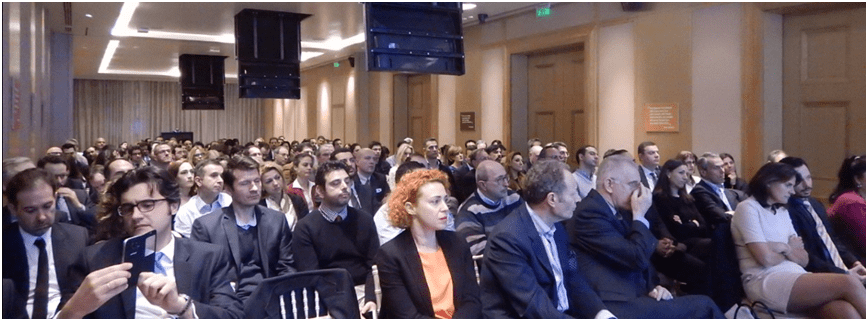Top Story
ULI Greece & Cyprus hosted the annual Emerging Trends in Real Estate® Europe 2017 presentation on Wednesday, 18 February 2017. The event was attended by more than 180 professionals across various disciplines of the Greek property industry, including investors, financiers, lawyers, architects, valuers and real estate consultants. The event was held at Eurobank’s ‘Bodosakion’ headquarters.
The event was opened by the incoming Chair of ULI Greece and Cyprus, Tassos Kotzanastassis, managing director of 8G Capital Partners Ltd. Tassos explained in brief ULI’s global profile, its membership base and the main benefits offered to members, mainly content access, local and global networking, events participation, best practices communication and knowledge sharing. He then presented the new Executive Committee and Advisory Board set out the main focus areas for the next two years: non-performing loans, hotels, sustainability and capital markets.
Keynote speaker Lisette Van Doorn, CEO ULI Europe started off by paying tribute to the outgoing Chair, George Kaburopoulos and thanked him for his contribution in establishing ULI Greece & Cyprus.
Van Doorn proceeded to present the findings of the Emerging Trends report, conducted by ULI and PwC and based on the opinions of more than 500 international renowned real estate professionals. She stressed the tumultuous environment and qualified the conclusions as these were based on interviews held in the second quarter of 2016, immediately after Brexit and before Donald Trump winning the US elections.
The main themes affecting investor sentiment across Europe were identified as political instability, currency volatility, social injustice and migration. All these factors are expected to impact negatively on economic growth. At the same time, the yields offered by the property sector are viewed as particularly attractive in the current environment of low and in cases negative interest rates. This has fuelled increased cross border capital flows into European property.
Van Doorn then focused on individual city investment prospects, analysing the latest Emerging Trends city rankings, the 10 first cities of which had been heavily boosted by the Brexit effect. In terms of long term trends, she referred to density, in that smart density is key to lower carbon emission, lower cost per resident and higher investment returns, redefining that way the conventional separation between prime and secondary space. In terms of sector trends, alternative asset classes have become the new norm, mostly driven by demographics. Perhaps the biggest trend impacting real estate between now and 2030 is technology, from a human behaviour perspective and the way it can adapt according to the way people live and operate today.
The presentation concluded with reference to the rank of Athens, citing its investment prospect during the last 10 years and some latest headlines regarding the Greek property sector.
The presentation was followed by a panel discussion and a short Q&A session. The panel comprised senior professionals of the local property investment community: George Chrysikos, CEO Grivalia REIC; Dr Aris Karytinos, CEO NBG Pangaea REIC; and Paul Gomopoulos, Managing Director Hines Greece. The discussion was moderated by Vasilis Vyzas, Partner PwC.
The panel deliberated on current issues of the local market, such as to what extent market slump can be reversed, which asset classes could be considered attractive and the whether new trends – such as sustainability – make sense in a depressed market. The consensus was that despite its shallow nature, the Greek market can deliver higher yields while under certain conditions can offer value-add opportunities, either through efficiency oriented redevelopment, or alternative classes such as student housing or serviced apartments. The panel pointed out the investor sentiment as presented by the Emerging Trends report needs to improve consistently, perhaps 2-3 years in a row, before investors are convinced to return. Furthermore, the report’s results tend to carry the sentiment of more core investors, thus ignoring the fact the several private equity and hedge funds maybe actively scouting the market for opportunities. In any event, it is imperative that there be reforms in institutional framework, and the planning system.
In his closing remarks, ULI Greece and Cyprus Chair Tassos Kotzanastassis thanked the audience and underlined that ULI is sector-agnostic, that is it is not restricted to valuers, lawyers or investors. Rather, it is a multi-discipline organisation where every professional related to real estate will find of value
